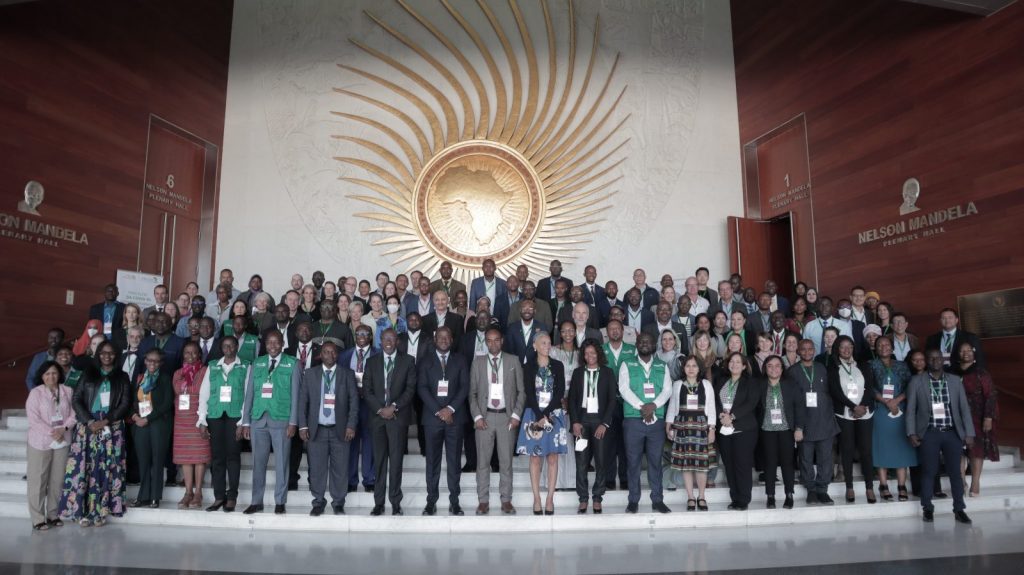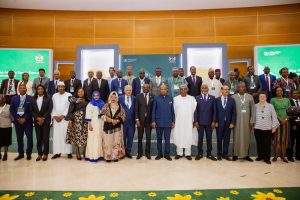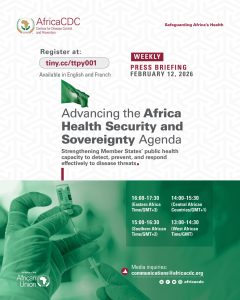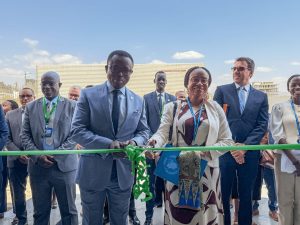Public health officials, experts, researchers, and scientists around Africa will gather at a major conference at the African Union Commission in Addis Ababa, Ethiopia, this week to take stock of how ready, in a post-COVID-19 world, African countries are to face up to the next disease threat.
‘Beyond COVID-19: Pathogen Genomics and Bioinformatics for Health Security in Africa’ will be hosted by the Africa Centres for Disease Control and Prevention (Africa CDC), the autonomous health institution of the African Union (AU). The meeting will be held at the AU’s Headquarters in Addis Ababa from 29 November to 1 December 2022.
The event will draw around 120 public health officials, researchers, and scientists from 49 AU Member States, as well as local and international partners.
The symposium will, in particular, focus on the existing capacity along the full value chain of pathogen genomics and bioinformatics. This entails everything from the sequencing and analysing of disease-causing pathogens, to issues of supply chain, the generation and sharing of data, as well as international policies and agreements that govern how these processes should unfold.
Participants will review the progress, challenges and lessons from the rapid expansion of pathogen genomics in Africa, through the Africa CDC’s Africa Pathogen Genomics Initiative (Africa PGI) and the work of other stakeholders over the past two years.
These endeavours all form part of the mission of the Africa CDC, which was launched in 2017, to coordinate continent-wide responses to emerging, re-emerging and other diseases in African countries, explains Dr Sofonias Tessema, programme lead for pathogen genomics at Africa CDC. The capacity in pathogen genomics, which is key to effective emergency response, was sorely lacking, he notes.
“Africa bears a disproportionate disease burden, and we face many deadly outbreaks every year, from Ebola and Cholera to Yellow Fever and polio,” says Dr Tessema. “Therefore, one of the foundational flagship projects of Africa CDC has been the setting up of capacity for pathogen sequencing around the continent. The project was initiated well before emergence of COVID-19, but it has certainly gained momentum because of the pandemic.”
“COVID-19 is a painful reminder of how ill prepared the continent was,” points out Dr Yenew Kebede, Head of the Division of Laboratory Systems and Network and Acting Head of Division of Surveillance and Disease Intelligence at Africa CDC.
In 2019, only seven of the 55 African Union Member States had public health laboratories or affiliates with next-generation sequencing (NGS) capacity. When COVID-19 hit the world in 2020, Africa CDC – working closely with the World Health Organisation’s Africa Regional Office (WHO AFRO) and other partners – was very quickly able to roll out sequencing technologies and training as countries and international agencies struggled to monitor the pandemic and keep track of emerging variants of SARS-CoV-2, the coronavirus causing the COVID-19 disease.
Today, public health laboratories in at least 37 African countries have NGS capacity, with training and equipment planned to be rolled out to even more African countries.
“No one would have asked for a global pandemic with its tragic human, social and economic costs,” says Dr Kebede. “But in exposing our shortcomings, COVID-19 also allowed us to do within a year or two what may have taken much longer under different circumstances.”
Efforts are now also under way to build on that momentum.
“We are now ready for the next phase, as the Africa PGI moves beyond COVID-19 and as attention shifts back to more local and regional disease outbreaks,” says Prof Alan Christoffels, Director of the South African National Bioinformatics Institute (SANBI) at the University of the Western Cape in South Africa, and Senior Advisor to Africa CDC. “It has now become more urgent that we capacitate individual countries.
SANBI is one of three specialist genomics and bioinformatics centres that initially served as the backbone of Africa CDC’s genomic sequencing programme, lending support to nine regional hubs around the continent.”
These hubs are public health laboratories able to sequence SARS-CoV-2 pathogens, services that each extended to its neighbouring countries.
“We are keen that all countries in Africa develop the capacity for sequencing pathogens themselves, so that they know what they are dealing with during each outbreak,” says Dr Ahmed Ogwell Ouma, Acting Director of Africa CDC. “We therefore must support individual countries to have the technology, the skills and the protocols in place to do so, as this new tool informs their response to outbreaks,
epidemics and even pandemics.”
The Addis Ababa meeting, he adds, is a critical part of ongoing work to realise this vision.
ENDS







